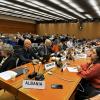News
Displaying Results 1 - 25 of 57
The impact of different air pollutants on vegetation and crops has been studied for over 35 years in the framework of the UNECE Convention on Long-range Transboundary Air Pollution, through its International Cooperative Programme on Effects of Air Pollution on Natural Vegetation and Crops (ICP…
The transport sector is responsible for 23% of global greenhouse gas emissions, with road transport accounting for around 77% of these emissions. As populations, economies, and the need for mobility grow, the World Bank estimates that greenhouse gas (GHG) emissions from transport could increase by…
Ensuring the principles of environmental democracy are upheld in relation to modified organisms/genetically modified organisms (LMOs/GMOs) can help countries to address biodiversity loss and support progress on a number of Sustainable Development Goals, in particular Goals 2 (zero hunger), 15 (life…
Cooperation and management of transboundary waters, which span over 45% of the world's surface and serve as vital resources for nearly half of the global population, face the imminent threat of underfunding. The last reporting exercise on Sustainable Development Goals (SDG) indicator 6.5.2 (2020),…
The Protocol on Pollutant Release and Transfer Registers (Protocol on PRTRs) sets international standards for reporting on pollutant releases from a range of economic activities, such as mineral industry operations, plastic production, waste and wastewater management or the rearing of poultry or…
Transparency in the environmental performance of economic activities and effective public access to environmental information, especially on products, are indispensable in addressing pressing environmental challenges. This also supports a just transition towards a green and circular economy,…
The Mediterranean Region, home to over 510 million people, is an important crossroads for economic, social and cultural exchanges between Europe, Africa, Asia and other continents. The region is rich in biodiversity, but has come under pressure due to the intensive exploitation of mineral resources…
In the UNECE region, the Fourth Cycle of Environmental Performance Reviews (EPR) kicks off with the review of Tajikistan, carried out for the fourth time under the leadership of UNECE.
A large, multidisciplinary team of international experts worked in Dushanbe from 6 to 15 November 2023,…
The European Commission has proposed a new legislation, the European Critical Raw Materials Act, to ensure a secure and sustainable supply of critical raw materials for the EU. The Act, on which the European Parliament and the European Council reached a provisional agreement on 13 November,…
Taking up some of the main results of the recent review report, which assessed the effectiveness of the amended Protocol to Abate Acidification, Eutrophication and Ground-Level Ozone (Gothenburg Protocol) under the UNECE Convention on Long-range Transboundary Air Pollution, experts discussed…
The public and civil society have a crucial role to play in tackling key environmental challenges. To make the most of this potential, continued efforts are needed to uphold their rights to shape environmental decision-making.
To this end, the Working Group of the Parties to the Convention on…
For some time now, Uzbekistan has been engaged in various activities under the UNECE Convention on Access to Information, Public Participation in Decision-making and Access to Justice in Environmental Matters (Aarhus Convention).
An international round table entitled “Aarhus Convention: Effective…
For many people around the world, the work and achievements of the United Nations remain in the realms of grand summits of heads of state on pressing global issues, of diplomatic brokering of peace agreements, of urgent humanitarian interventions for people in the greatest need, and other high-…
Over two-thirds of Togo’s water resources are shared, notably through the Mono River basin (shared with Benin) and Volta River basin (shared with Benin, Burkina Faso, Côte d’Ivoire, Ghana and Mali), as well as aquifers in the coastal sedimentary basin (shared with Ghana, Benin and Nigeria).
In a…
To address the conclusions of the review of the amended Protocol to Abate Acidification, Eutrophication and Ground-Level Ozone (Gothenburg Protocol), as adopted by the Executive Body to the UNECE Convention on Long-range Transboundary Air Pollution in December 2022, further work is currently being…
How can regional and international cooperation be fostered in a region that faces unprecedented water scarcity? How can the benefits of this vital resource be shared to increase resilience to climate change?
The Third Baghdad International Water Conference titled "Water Scarcity, the Mesopotamian…
Originally published as a guest article by IISD’s SDG Knowledge Hub.
How can we rescue the vision of the 2030 Agenda for Sustainable Development and get in shape for Our Common Agenda for 2050? Part of the way forward is without doubt to embrace the digital and green transitions.
As we heard…
Countries are increasingly facing multiple interlinked environmental, social, economic and health challenges – climate change, pollution from chemicals and wastes, biodiversity loss and species extinction, deforestation, land degradation, emerging zoonotic diseases, and the impact of armed…
Halfway to 2030, the future we want seems to be still well out of reach. The 2023 SDG progress report for the UNECE Region, which informed discussions at the inclusive and 1000-strong Regional Forum on Sustainable Development held last week, showed that despite some bright spots, we face a troubled…
Innovation and Technology, which is the focus of this year’s International Women’s Day, presents powerful opportunities for gender equality, and offers welcome hope at a time of great challenges for women’s empowerment. In fact, the regional progress report on the Sustainable Development Goals (…
Inland transport plays a crucial role in the global economy, connecting people, goods and services to markets and opportunities. However, the rapid growth in this sector has had a significant impact on the environment. The increasing demand for faster and more efficient modes of transport has led…
Participants in the motor industry’s complex supply chains, regulators as well as investors seeking to invest sustainably are increasingly interested in considering the carbon footprint of vehicles over their entire lifetime - from material extraction and production to manufacturing, use and…
At its seventy-seventh meeting (Geneva, 13–16 December 2022), the Compliance Committee of the UNECE Convention on Access to Information, Public Participation in Decision-Making and Access to Justice in Environmental Matters (Aarhus Convention) invited fourteen Parties to attend open sessions to…
With climate and biodiversity loss heading the news these days, another problem related to the planet we all share is often forgotten: air pollution. Air pollution has an enormous burden on public health, ecosystems, climate, and ultimately, the economy. Globally, the World Health Organization (…
The UNECE Protocol on Pollutant Release and Transfer Registers (PRTRs) continues to support actions to promote transparency in environmental matters across the globe. It drives the development of national legislation and practice towards a common set of international standards, bringing about…

























